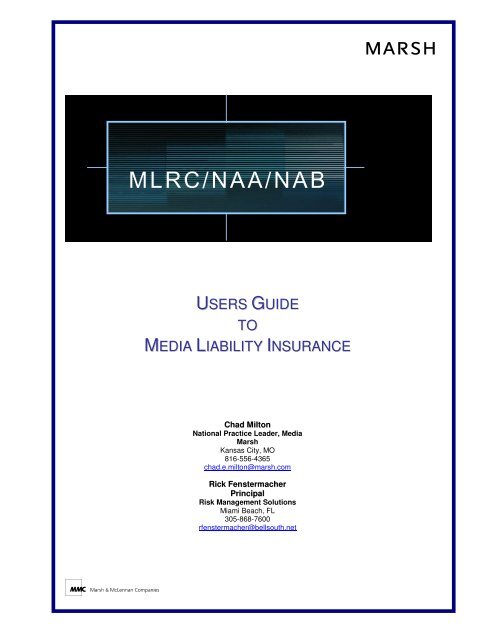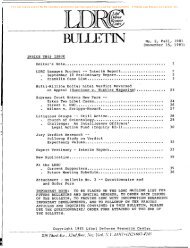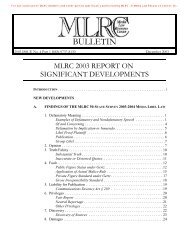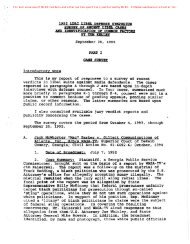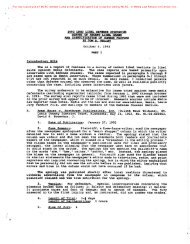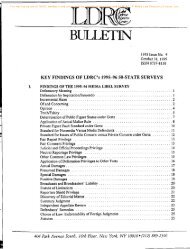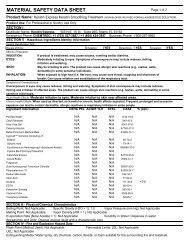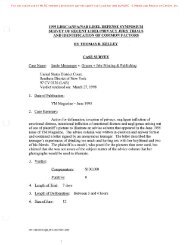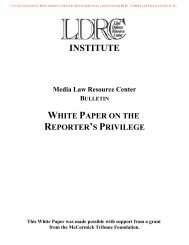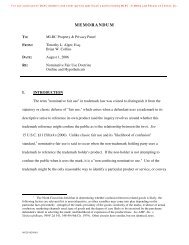You also want an ePaper? Increase the reach of your titles
YUMPU automatically turns print PDFs into web optimized ePapers that Google loves.
<strong>MLRC</strong>/<strong>NAA</strong>/<strong>NAB</strong><br />
USERS GUIDE<br />
TO<br />
MEDIA LIABILITY INSURANCE<br />
Chad Milton<br />
National Practice Leader, Media<br />
Marsh<br />
Kansas City, MO<br />
816-556-4365<br />
chad.e.milton@marsh.<strong>com</strong><br />
Rick Fenstermacher<br />
Principal<br />
Risk Management Solutions<br />
Miami Beach, FL<br />
305-868-7600<br />
rfenstermacher@bellsouth.net
<strong>MLRC</strong>/<strong>NAA</strong>/<strong>NAB</strong> LIBEL CONFERENCE<br />
USERS GUIDE TO MEDIA LIABILITY INSURANCE<br />
Media Insurance Food Chain<br />
Media Insurance Food Chain<br />
Insured’s Team<br />
Insurance Company Team<br />
Client<br />
Broker<br />
Insurance Company<br />
Excess insurance<br />
Company<br />
Managing Agent<br />
Consultant Wholesaler<br />
Reinsurance Broker<br />
Reinsurance Broker<br />
Reinsurance Company Reinsurance Company<br />
Marsh<br />
Page 1<br />
c:\documents and settings\attorney2\desktop\2006 conference\users guide to media liability insurance.doc
<strong>MLRC</strong>/<strong>NAA</strong>/<strong>NAB</strong> LIBEL CONFERENCE<br />
USERS GUIDE TO MEDIA LIABILITY INSURANCE<br />
I. Who does what to whom? The Food Chain<br />
A. Insured/Buyer/Policyholder<br />
i. Role: Pay the premium and stay out of claims<br />
B. Consultants<br />
i. Role: Advise Insured on risk management and insurance issues; can be outsourced<br />
risk management<br />
ii. Compensation: Fee paid by client/insured<br />
C. Brokers<br />
i. Role: Advise Insured on risk management and insurance issues/ negotiate with<br />
underwriters and place insurance<br />
ii. Compensation: Commission paid by insurer or fee paid by client/insured<br />
D. Retail Agents<br />
i. Role (Same as Broker)<br />
ii. Compensation: Commission paid by insurer or fee paid by client/insured<br />
E. Wholesalers<br />
i. Role: Help brokers (generally smaller brokers) with placement of insurance<br />
ii. Compensation: Commission paid by insurer<br />
F. Agents/Managing Agents<br />
i. Role: Represent insurer as underwriter and/or claim manager<br />
ii. Compensation: Commission paid by insurer<br />
G. Underwriters/Insurers (Primary and Excess)<br />
i. Role: Accept the risk being insured and pay losses<br />
ii. Compensation: Premiums less losses and expenses<br />
H. Reinsurers<br />
i. Role: Accept part of the risk assumed by an insurer<br />
ii. Compensation: Premium paid by the insurer<br />
I. Reinsurance Brokers<br />
i. Role: Negotiate reinsurance for insurers<br />
ii. Compensation: Commission paid by reinsurers or fee paid by insurer<br />
Media Liability Insurers<br />
• Media / Professional Insurance for:<br />
-National Casualty<br />
-Axis<br />
• Chubb Group<br />
• One Beacon Professional Partners/First Media<br />
• Mutual Insurance Co., Ltd. (Bermuda)<br />
• American International Group<br />
• ACE<br />
• Hiscox<br />
• Beazley<br />
Marsh<br />
Page 2<br />
c:\documents and settings\attorney2\desktop\2006 conference\users guide to media liability insurance.doc
<strong>MLRC</strong>/<strong>NAA</strong>/<strong>NAB</strong> LIBEL CONFERENCE<br />
USERS GUIDE TO MEDIA LIABILITY INSURANCE<br />
II. Where Does the Money Go?<br />
A. Insurer Expenses<br />
i. Commissions and fees<br />
ii. Underwriting expenses<br />
iii. Overhead and profit<br />
B. Defense costs and settlement<br />
i. Legal expense counts and amounts to 75-80% of the total losses<br />
C. Calculating a loss ratio/what is acceptable<br />
i. Losses = Loss = Loss Ratio Ratio<br />
Premium<br />
ii. Paid Losses = Paid<br />
Paid<br />
Loss<br />
Loss<br />
Ratio<br />
Ratio<br />
Paid Premium<br />
iii. Incurred Losses<br />
Earned Premium<br />
=Incurred Loss Ratio<br />
= Incurred Loss Ratio<br />
iv. Incurred Losses + IBNR<br />
Written Premium<br />
=Underwriting Loss Ratio<br />
= Underwriting Loss Ratio<br />
Outstanding < 10%<br />
Favorable 10% > 30%<br />
Acceptable 30% > 50%<br />
Marginal 50% > 70%<br />
Adverse > 70%<br />
Increase<br />
Media Liability Attorney (Per Hour)<br />
65.60%<br />
Media Liability Premium (Newspaper, Cable & TV)<br />
3.40%<br />
Berkshire Hathaway (1 Class 'A' Share<br />
413%<br />
Florida Hurrican Insurance ($1mil Limit)<br />
1255%<br />
Private College Tuition<br />
49.70%<br />
Premium Gasoline (Per Gallon)<br />
26.50%<br />
Prime Rate<br />
-47.00%<br />
Consumer Price Index<br />
22.60%<br />
-60.00% -40.00% -20.00% 0.00% 20.00% 40.00% 60.00% 80.00%<br />
Marsh<br />
Page 3<br />
c:\documents and settings\attorney2\desktop\2006 conference\users guide to media liability insurance.doc
<strong>MLRC</strong>/<strong>NAA</strong>/<strong>NAB</strong> LIBEL CONFERENCE<br />
USERS GUIDE TO MEDIA LIABILITY INSURANCE<br />
III. How Underwriting Decisions Are Made<br />
A. Size<br />
i. Underwriters claim, with actuarial support, that large accounts produce large claims<br />
ii. Small accounts may have a hard time paying the deductible and premium<br />
B. Location<br />
i. Some states are suspect<br />
ii. National or regional audience not necessarily a problem<br />
iii. Audience likely to sue abroad?<br />
C. Medium/Media<br />
i. Media involving technology suspect<br />
ii. Feature film are suspect<br />
D. Publication or program formats<br />
i. Straight news best received by underwriters<br />
ii. Reality TV is suspect<br />
iii. Music is problematic<br />
E. Nature of content<br />
i. Investigative/prosecutorial<br />
ii. Hidden Cameras<br />
iii. Humiliating<br />
iv. Private stories<br />
v. Medical – for E&O<br />
vi. Entertainment can be a problem<br />
vii. Indecency causes concern<br />
F. Internal controls/loss prevention<br />
i. More is better<br />
ii. Underwriters look for editorial controls, training, involvement of lawyers<br />
G. Claim history<br />
i. Less is better<br />
ii. Underwriters assume that past history is predictor of future<br />
H. Non-content exposures<br />
i. Aggressive newsgathering<br />
ii. Ancillary businesses<br />
iii. Non-media businesses, especially involving technology, are suspect<br />
I. Underwriting the retention (deductible)<br />
i. Relative to size of client<br />
ii. Underwriter minimums<br />
iii. Benchmarked from claim history<br />
iv. Keyed to cost of successfully defending claims<br />
J. Premium calculations can include:<br />
i. Formula, usually based on revenues, subject to debits and credits<br />
ii. What the market will bear<br />
iii. Increases/decreases keyed to actuarial targets<br />
iv. Price for expected losses over time<br />
Marsh<br />
Page 4<br />
c:\documents and settings\attorney2\desktop\2006 conference\users guide to media liability insurance.doc
<strong>MLRC</strong>/<strong>NAA</strong>/<strong>NAB</strong> LIBEL CONFERENCE<br />
USERS GUIDE TO MEDIA LIABILITY INSURANCE<br />
IV. Impact on Insured of High Retention<br />
A. Control of defense enhanced<br />
B. Reporting new and ongoing claims may still be required, but may also seem<br />
pointless and burdensome<br />
C. Increased burden of keeping track of developments and costs<br />
D. Contacting insurer only in catastrophes weakens ongoing relationship<br />
V. Claims Handling Decisions<br />
A. Choice of defense counsel<br />
i. Initial choice matter of contract (policy wording)<br />
ii. When insurer has input, factors include:<br />
a. Hourly rate: only objective factor<br />
b. Experience and skill appropriate to the case<br />
c. Efficiency<br />
d. Compliance with guidelines: billing, reporting<br />
e. No surprises: events and severity<br />
f. Appreciation of insurer role<br />
g. Respect<br />
B. Effect of reporting, billing and other defense guidelines<br />
i. Expenses in breach may not get paid<br />
ii. May limit defense tactics<br />
iii. Query ethics of foregoing re<strong>com</strong>mended tasks<br />
C. Settlements and defense guidelines<br />
i. Micro factors: cost/benefit in each case<br />
ii. Macro factors: client relationship, reputation in industry<br />
iii. Mega factors: corporate and reinsurance mandates and budgets<br />
Marsh<br />
Page 5<br />
c:\documents and settings\attorney2\desktop\2006 conference\users guide to media liability insurance.doc
<strong>MLRC</strong>/<strong>NAA</strong>/<strong>NAB</strong> LIBEL CONFERENCE<br />
USERS GUIDE TO MEDIA LIABILITY INSURANCE<br />
Media Policy Primer<br />
I. Two Types of Policies:<br />
A. All Risk, subject to exclusions<br />
B. Named peril, subject to exclusions<br />
II. Two Triggers<br />
A. Occurrence:<br />
i. Covers events which occur during the policy period, regardless of when claim is<br />
reported.<br />
B. Claims-made:<br />
i. Covers events which occur during the policy period AND are reported during the<br />
policy period, or during a specific extended claims reporting period [ECRP] after the<br />
policy expiration;<br />
ii. N.B. ECRP’s typically:<br />
a. Range from 30 days to 2 years;<br />
b. Can include a premium charge up to 300% of the expiring premium;<br />
c. May not be available if the current insurer offers renewal terms, even if the terms<br />
are prohibitive in cost, restrict coverage, increase retentions or reduce limits.<br />
III. Core Coverage<br />
• Libel, slander, defamation, disparagement<br />
• Invasion / infringement of privacy or publicity; false light;<br />
• Wrongful entry, trespass or eavesdropping<br />
• Copyright infringement, plagiarism, piracy, misappropriation;<br />
• Infringement of title, slogan, trademark, trade name, trade dress, service mark;<br />
• Error, omission, misstatement or misleading statement;<br />
• Infliction of emotional distress, outrageous conduct.<br />
IV. Typical Exclusions<br />
• “Alphabet” Exclusions: ASCAP, BMI, ERISA, FCC, FTC, HHS, OCR, RICO, SEC,<br />
SESAC, TRIA;<br />
• Intentional acts;<br />
• Criminal, dishonest, fraudulent, malicious acts;<br />
• Infringement of patent, trade secret;<br />
• Anti-trust, restraint of trade, unfair or deceptive business practices, unfair <strong>com</strong>petition;<br />
• Employment practices;<br />
• Bodily injury or property damage;<br />
• Claims by independent contractors in rights disputes<br />
• Digital copies of freelance works:<br />
• Music downloading;<br />
• Computer security;<br />
• Coupons, prizes, awards;<br />
• Fines, penalties & taxes;<br />
• Loss of profits;<br />
• Costs of recall, reproduction, reprinting or correction.<br />
Marsh<br />
Page 6<br />
c:\documents and settings\attorney2\desktop\2006 conference\users guide to media liability insurance.doc
<strong>MLRC</strong>/<strong>NAA</strong>/<strong>NAB</strong> LIBEL CONFERENCE<br />
USERS GUIDE TO MEDIA LIABILITY INSURANCE<br />
V. Options (not offered by all insurers)<br />
• Worldwide territory (claims filed outside U.S.);<br />
• Bodily injury and Property damage;<br />
• Choice of counsel;<br />
• Multiple (or unlimited) annual aggregate limits;<br />
• Punitive damages (where contrary to public policy);<br />
• Elimination or modification of “Hammer” clause (Forced Settlement provision);<br />
• Newsgathering (without publication)<br />
VI. Related Acts<br />
• Acts that are the same, continuous repeated, or in a series of interrelated acts or are<br />
temporally, logically or causally connected by facts, circumstances, situations,<br />
transactions, events, advice, dissemination, utterances of decisions are deemed to be a<br />
single act.<br />
or “Recurring Coverage Issues”<br />
• Acts that involve the same or related subject, person, class of person or have <strong>com</strong>mon<br />
facts or circumstances or involve <strong>com</strong>mon transactions, events or decisions, regardless<br />
of the number of renditions, alterations, actions or forms of <strong>com</strong>munication will be treated<br />
as one act.<br />
Marsh<br />
Page 7<br />
c:\documents and settings\attorney2\desktop\2006 conference\users guide to media liability insurance.doc
<strong>MLRC</strong>/<strong>NAA</strong>/<strong>NAB</strong> LIBEL CONFERENCE<br />
USERS GUIDE TO MEDIA LIABILITY INSURANCE<br />
Recurring Coverage Issues<br />
I. Bodily Injury / Property Damage<br />
Most Media Liability insurers will delete exclusion as it relates to content.<br />
Claim Example:<br />
• Southern Living magazine publishes a recipe for “ice box dinner rolls” in the April 2004<br />
issue.<br />
<br />
<br />
<br />
<br />
The recipe called for boiling one cup of water and a half cup of shortening over high<br />
heat for 5 minutes. Unfortunately, the <strong>com</strong>bination of hot fat and boiling water had a<br />
volcano effect injuring at least 5 readers.<br />
The magazine issued its first product recall in 40 years, warning its 2.6 million<br />
subscribers of a “potential fire and safety hazard” and requested that distributors<br />
remove copies from newsstands.<br />
The standard Commercial General Liability policy excludes losses “relating to<br />
content”.<br />
Neither the Commercial General Liability nor Media Liability policies will cover the<br />
costs or recall or reprinting.<br />
II. Forced Settlement (Hammer) Clause<br />
“We have the right to investigate any claim, and with your written consent, settle any<br />
claims if we believe that it is proper. Our duty to defend ends if you refuse to consent<br />
to a settlement we re<strong>com</strong>mend and the claimant will accept. You must then defend the<br />
claim at your own expense and negotiate any settlement.”<br />
Solutions:<br />
1. Replace the condition with:<br />
“No settlement shall be made without the Company’s consent, such consent shall not to<br />
be unreasonably withheld” or<br />
“The Company shall not settle Claims under this policy without the consent of the<br />
Insured, and the Company’s duty to defend and to pay Loss (including Defense Costs)<br />
shall not be limited by the Insured’s refusal to consent to any settlement”<br />
2. If the Company will not delete the condition in its entirety, negotiate a <strong>com</strong>promise:<br />
“The Company’s liability for any settlement or judgment will not be more than the amount<br />
for which the claim could have been settled had you consented, plus fifty percent (50%)<br />
of the costs and expenses incurred subsequent to the date of such refusal.”<br />
Marsh<br />
Page 8<br />
c:\documents and settings\attorney2\desktop\2006 conference\users guide to media liability insurance.doc
<strong>MLRC</strong>/<strong>NAA</strong>/<strong>NAB</strong> LIBEL CONFERENCE<br />
USERS GUIDE TO MEDIA LIABILITY INSURANCE<br />
III. Selection of Counsel<br />
Many insurers require that they employ defense counsel for all claims. While presented as<br />
part of their “duty to defend” it can also provide control – control of defense costs and<br />
out<strong>com</strong>e (see Forced Settlement).<br />
Solution:<br />
1. Some insurers will consent to the insured’s selection of counsel:<br />
“Retain counsel, subject to the continuing approval of the Company”; or<br />
“The Insured shall have the duty to defend Claims . . . and may retain counsel of its own<br />
choosing with the Underwriter’s prior consent, such consent not to be unreasonably<br />
withheld.”<br />
2. Other insurers will impose conditions:<br />
“With regard to any claim for which you seek coverage, the initial choice of counsel shall<br />
be made by you from the list of firms in the Schedule at an agreed hourly rate of $--- per<br />
partner, $--- per associate and $--- per paralegal. Fees, costs, charges and billings<br />
incurred through any law firm or other service provider, other than chosen counsel or a<br />
firm that we consented to or selected, shall not be recoverable under this policy as claims<br />
expense”<br />
IV. Over Redemption<br />
Claim scenario:<br />
• A national pizza chain wants the following ad printed in the local newspaper:<br />
The actual ad reads:<br />
“Two large pizzas + liter of XXX [beverage] for $15.00”<br />
BUT<br />
“Two large pizzas + liter of [beverage] for $.15”<br />
With total circulation of 2,000,000 and a typical response rate of 2%, the potential loss is<br />
$594,000 [40,000 x $14.85]. But the deal is so good, the actual response rate is 5%,<br />
creating a loss of $1,485,000.<br />
While most insurers will not delete the “coupons, prizes or over-redemption” exclusion,<br />
several will consider a sub-limit of $100,000 to $1,000,000 for an additional premium.<br />
Marsh<br />
Page 9<br />
c:\documents and settings\attorney2\desktop\2006 conference\users guide to media liability insurance.doc
<strong>MLRC</strong>/<strong>NAA</strong>/<strong>NAB</strong> LIBEL CONFERENCE<br />
USERS GUIDE TO MEDIA LIABILITY INSURANCE<br />
V. Worldwide Territory<br />
Many liability policies provide coverage for “. . . suits first brought in the United States”.<br />
With many publications distributed overseas in print or online, plaintiffs may file suit in a<br />
foreign jurisdiction more favorable to their interests.<br />
Solution:<br />
Most Media Liability insurers will grant “worldwide territory.”<br />
VI. Bad Acts Exclusions<br />
A. State Law Starting Point<br />
i. Common law: “public policy forbids indemnifying a person for his own willful<br />
wrongdoing” (SupCt AZ, 1984)<br />
ii. Statute (CA, e.g.): insurer is relieved if "loss is caused by the willful act of the<br />
insured."<br />
B. Basics<br />
i. This policy does not apply to liability arising out of: . . Criminal or dishonest acts.<br />
ii. This policy does not apply to any Claim against the Insured: . . .Based on or arising<br />
out of any actual dishonest, fraudulent, criminal or malicious act or omission by an<br />
Insured, however, this exclusion shall not apply to Claims Expenses or the<br />
Company’s duty to defend any such claim.<br />
iii. The Company shall not be obligated to defend or to pay damages or claim expense<br />
resulting from claims:...for or arising from any act that a jury or court finds to be<br />
dishonest, fraudulent.<br />
C. Targeted to Specific Conduct<br />
i. This policy does not apply to liability arising out of:….violations of federal or state<br />
wiretapping laws, telephone, <strong>com</strong>puter and other laws for the protection of<br />
consumer privacy including, but not limited to, the Telephone Consumer Protection<br />
Act (47 U.S.C. §227, as amended).<br />
D. State of Mind<br />
i. This policy does not cover any claim, loss or wrongful act: . .<br />
ii. Arising out of or resulting, directly or indirectly, from any dishonest, fraudulent,<br />
criminal or malicious act error or omission, or any intentional or knowing violation of<br />
the law.<br />
iii. Arising out of a wrongful act <strong>com</strong>mitted with the knowledge that it was a wrongful<br />
act.<br />
E. Forgivable Misconduct<br />
i. The Company shall not be obligated to defend or pay loss or defense costs arising<br />
from claims: . . . For violation of a criminal statute, (as finally determined); except<br />
this exclusion shall not apply if the insured’s counsel had previously authorized such<br />
act or omission based upon a good faith belief that the criminal state violated the<br />
First Amendment (or similar state constitutional provision) or a good faith belief that<br />
the act or omission was not a violation of such criminal statute.<br />
Marsh<br />
Page 10<br />
c:\documents and settings\attorney2\desktop\2006 conference\users guide to media liability insurance.doc
<strong>MLRC</strong>/<strong>NAA</strong>/<strong>NAB</strong> LIBEL CONFERENCE<br />
USERS GUIDE TO MEDIA LIABILITY INSURANCE<br />
V. Punitive Damages<br />
A. OFFSHORE INSURERS<br />
i. Specifically include punitives in definition of damages<br />
B. DOMESTIC U.S. INSURERS<br />
i. Most include punitives in definition of damages, but with conditional language, e.g.:<br />
“With regard to punitive damages, this insurance shall apply to the fullest extent<br />
permitted by law. Where an Insured determines, based upon written opinion of<br />
counsel, that punitive damages are insurable under any applicable law, the<br />
Underwriter shall not challenge the Insured’s determination of insurability”<br />
“Damages does not include matter which may be deemed uninsurable under the law<br />
pursuant to which this policy shall be construed”<br />
Terms of this policy, including but not limited to the definition of damages, which are<br />
in conflict with the statutes or public policy of the State wherein this policy is issued<br />
are hereby amended to conform to such statutes or public policy”<br />
ii. Many domestic insurers have arrangements with off-shore insurers to underwrite<br />
“contingent punitive damages / punitive-wrap” policies.<br />
Marsh<br />
Page 11<br />
c:\documents and settings\attorney2\desktop\2006 conference\users guide to media liability insurance.doc
Marsh USA Inc.<br />
2405 Grand Boulevard<br />
Suite 1500<br />
Kansas City, MO 64108<br />
816 221 4422<br />
Risk Management Solutions, Inc<br />
6444 Allison Road<br />
Miami Beach, FL 33141<br />
305-868-7600


